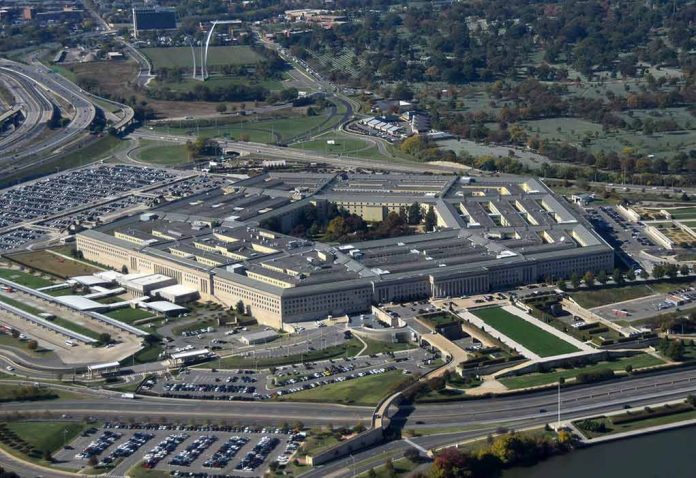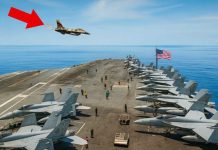
The Pentagon’s collaboration with Kratos on a $1.45 billion hypersonic technology contract reflects urgency in countering global competition.
At a Glance
- Kratos was awarded a $1.45 billion contract by the U.S. Department of Defense for hypersonic testing.
- The MACH-TB program aims to expedite hypersonic weapons development.
- The contract involves a five-year Other Transaction Authority agreement under the MACH-TB 2.0 initiative.
- Efforts are underway to close the hypersonic weapons gap with China and Russia.
- A recent successful hypersonic missile test underscores the critical nature of these initiatives.
Kratos Secures Massive Defense Contract
Kratos Defense & Security Solutions has been granted a $1.45 billion contract by the Pentagon to lead the Multi-Service Advanced Capability Hypersonic Test Bed (MACH-TB) program. The initiative, overseen by the Office of the Undersecretary of Defense for Research and Engineering, aims to accelerate the U.S. military’s hypersonic weapons development capabilities. The MACH-TB program plays a vital role in ensuring that the U.S. retains a tactical edge against adversaries.
This partnership will see Kratos leading a coalition of technology firms, including Leidos, Rocket Lab, and Stratolaunch. These entities will work to augment hypersonic testing capacities utilizing commercial infrastructure. Designed to align hypersonic ground tests with full-scale system-level flight tests, the project reduces development risks and aims for swift deployment. Hypersonic weapons, capable of exceeding Mach 5, are crucial for evading contemporary missile defense systems.
📌@KratosDefense secures a $1.45B contract from the Pentagon for the MACH-TB 2.0 program, advancing hypersonic test bed technology! The largest deal in the company’s history.https://t.co/W9yKbny4HT
— Defensehere (@defensehere_en) January 7, 2025
Strategic Intent to Counter Global Rivals
Task Area 1 of the MACH-TB 2.0 initiative is heavily focused on systems engineering, integration, and testing (SEIT). This broader strategy reportedly looks to bridge the capabilities gap in hypersonic technology between the U.S., China, and Russia. These countries have made strides with operational hypersonic systems. The Pentagon’s swift actions further underscore the critical nature of advancing military technology. The defense industry witnesses growing competition from commercial entities, with the market valued at $6 billion to $7 billion annually.
Recent weeks have seen significant progress in the U.S.’s hypersonic endeavors, marked by a successful joint Army-Navy missile test. The Air Force is also ramping up its hypersonic projects, signaling an overall acceleration in the United States’ hypersonic arms advancement.
"Kratos wins $1.45 billion Pentagon contract for hypersonic testing" ^
Supporting MACH-TB ¹ w/HASTE-2 ' " ¹
& ROC 20 "' ¹
_
"'https://t.co/969tuuJ478
"https://t.co/aqJcwDbSfb
'https://t.co/8qtBG2bWdM
^ https://t.co/NvX26XewdK
²https://t.co/RNSW5raA0B
¹https://t.co/r9BpPDMnaF
¹🖼️ pic.twitter.com/FvkQDCZf7K— Future Spaces (@SpacesFuture) January 6, 2025
Harnessing Commercial Innovations
Using commercial infrastructure to bolster testing, the MACH-TB program encourages collaboration between defense and industry leaders. Kratos, renowned for its Erinyes Hypersonic Flyer and Zeus Solid Rocket Motors, leads these ventures with a proven track record in hypersonic systems. The initiative promotes high-speed, maneuverable flying testbeds, crucial for evaluating hypersonic subsystems exceeding Mach 5. This achievement is central to outpaced development timelines while ensuring military capabilities remain formidable in the face of evolving global threats.
The U.S. Department of Defense’s proactive measures underscore the importance of maintaining a technological edge over China and Russia. The MACH-TB program aims to remain a cornerstone of American military innovation, signifying an era of rapidly advancing military prowess.
Sources
- Kratos Receives $1.45B MACH-TB 2.0 Contract Award
- Kratos Secures $1.45 Billion U.S. Defense Contract for Hypersonic Testing
- US billion-dollar hypersonic deal to counter China, Russia at 5 times the speed of sound













